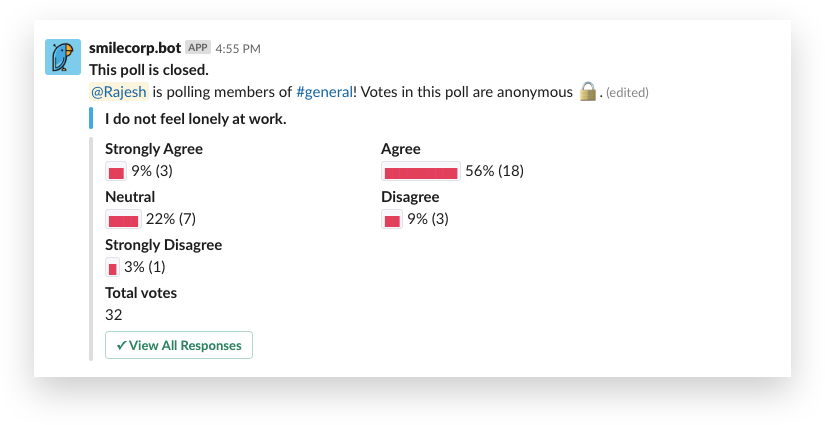A company thrives by playing to its strengths. Since 2013, New York–based IT startup Ultra Testing has set itself apart in the field of software and data quality engineering by actively recruiting autistic talent. Seventy-five percent of the team is on the autism spectrum, and the entire team works from home. These individuals have a skill set tailor-made for quality engineering, with an aptitude for pattern recognition, logical reasoning and systems thinking.
Remote work can be isolating, especially for such a diverse team with a wide range of learning styles, communication needs and stress triggers. Social isolation is far from a unique workplace problem, though. In fact, more than 40% of American adults experience loneliness.
To combat the tendency toward social isolation—and make sure its employees can do their best work—Ultra has made it easier for team members to understand one another’s strengths, spot when people might be feeling lonely, and identify areas for improvement that enable employees to shine even brighter. And while Ultra’s workforce demographics may differ from your own, the tools it’s employing are far from tailor-made.
“We don’t think of what we’re doing as creating accommodations for colleagues who might be wired differently,” says Ultra Testing CEO and co-founder Rajesh Anandan. “We try to make sure that the workplace norms and the business practices that we’re developing are truly inclusive, and ultimately, better for everyone.”
Here, Anandan details two tools that the Ultra team is using to bridge the gaps between its employees.
The employee Biodex: streamlining the “get to know you” process
No matter where you sit in your office, getting to know coworkers—and how to best communicate with and support them—is hard. For a company like Ultra, which is entirely remote and scrambles teammates depending on the project, that challenge compounds.
“During the initial days and weeks of a project, there is a period of getting to know each other that’s incredibly inefficient for the team,” says Anandan. “That’s any team, not just our team, which includes a wide range of communication styles, learning styles, information processing models and stress triggers.”
An Ultra team member commented in passing a wish that everyone in the organization came with a user manual. That got the rest of the team thinking, why not?—sparking the creation of the Biodex, a 28-field personal “user manual” attached to each employee’s Slack profile.
In the Biodex, employees describe how they work best. For example, what is their usual response time on Slack? If someone operates on an “end of day” basis, that lets colleagues know not to expect an immediate response. What is their preferred channel of communication? It could be the “faceless” communication of Slack or face-to-face collaboration over video chat.
Everyone at Ultra has a Biodex linked to his or her Slack profile, and completing a Biodex—along with reviewing everyone else’s—is a foundational piece of company onboarding.
One especially helpful Biodex question asks how team members prefer to receive feedback. For example, do you prefer receiving feedback in the moment or at the end of the day? Is a live conversation best, or do you prefer something in writing? For Anandan, every answer is mission-critical. “Our survival depends on everyone being able to learn fast,” he says. “Learning requires coaching, and coaching requires feedback.”
A bot that takes the pulse of employee happiness
From day one, the team at Ultra has taken a daily survey of employees happiness. These days, however, survey is delivered through Slack’s integration with the popular polling app Polly—and affectionately named Smilecorp.

Every day at 5 p.m. local time, each team member gets a direct message with a single Smilecorp poll, which is measured on a Likert scale (strongly agree, agree, neutral, disagree, strongly disagree). There are more than a dozen topics in total, and prompts include:
- My unique strengths are understood and valued at the company
- I receive regular feedback on my job performance
- I have access to the resources and tools I need to develop my skills and grow professionally
- I’m comfortable sharing my needs and questions with my supervisors
- I do not feel lonely at work
“Together, they represent the things we believe we should be measuring in terms of creating an inclusive workplace,” says Anandan.
Ultra turns several of those dimensions into key performance indicators (e.g. a team net loneliness score), which are published to the same company dashboard as typical business metrics like revenue and net promoter score. The results are analyzed quarterly for trends and lead to deeper discussions that unearth an issue’s root cause and identify solutions.
What gets measured, gets done
The last several quarters of data at Ultra show that fewer than 15% of its employees report feeling lonely at work—far below the 40% stat for American adults.
“If you’re measuring wellbeing, then it creates accountability throughout the organization,” says Anandan. “People are going to be more mindful of how their colleagues are doing and more proactive about helping them succeed.”






